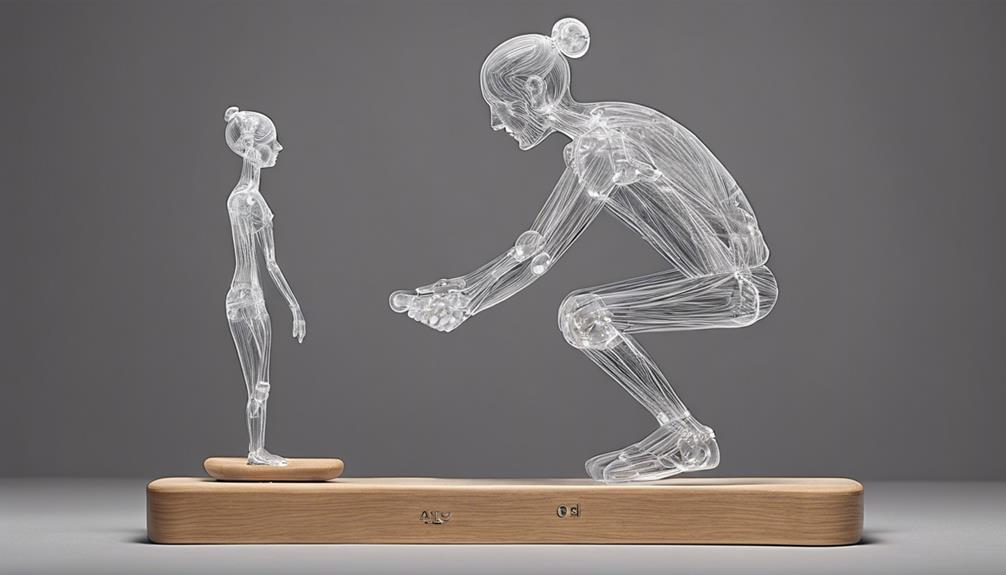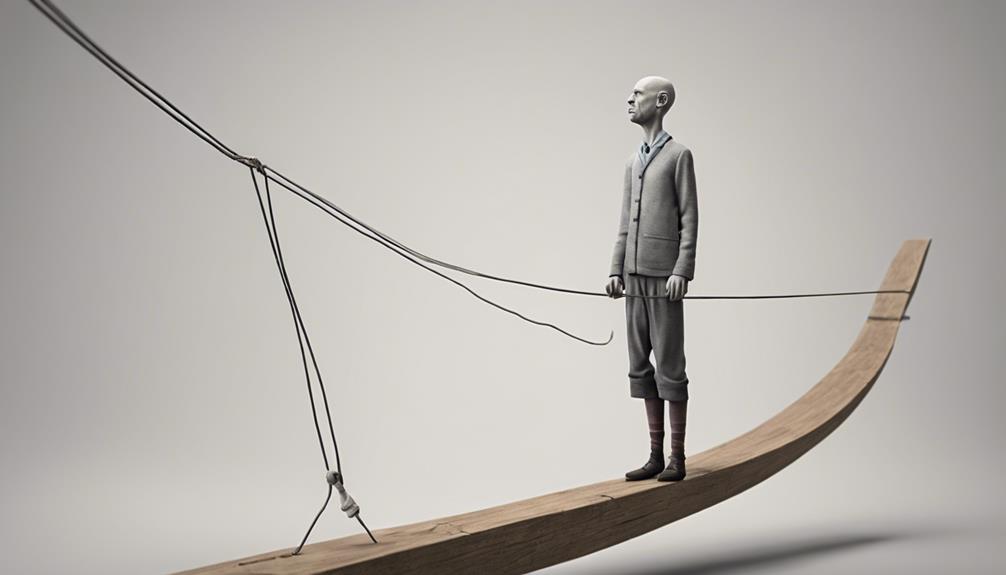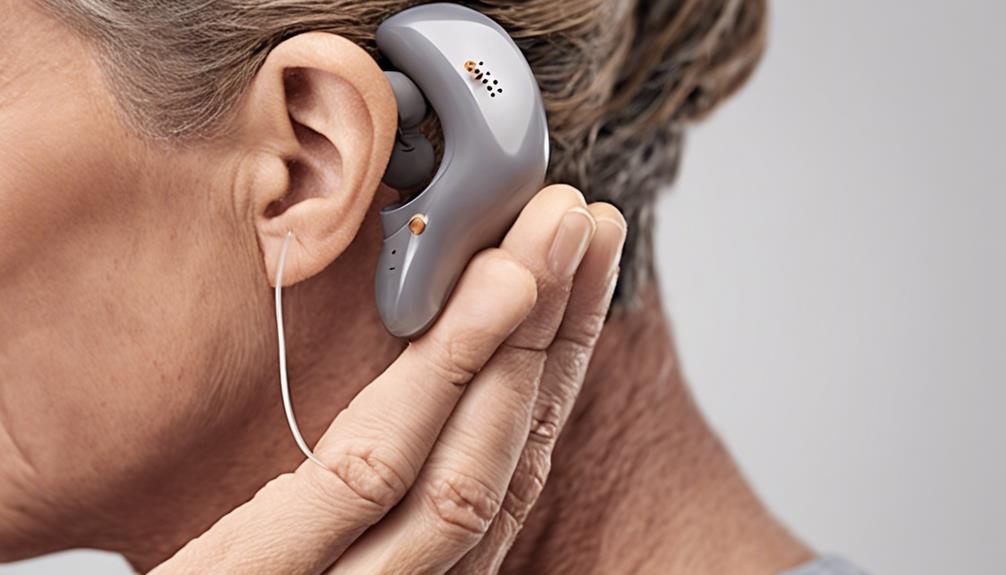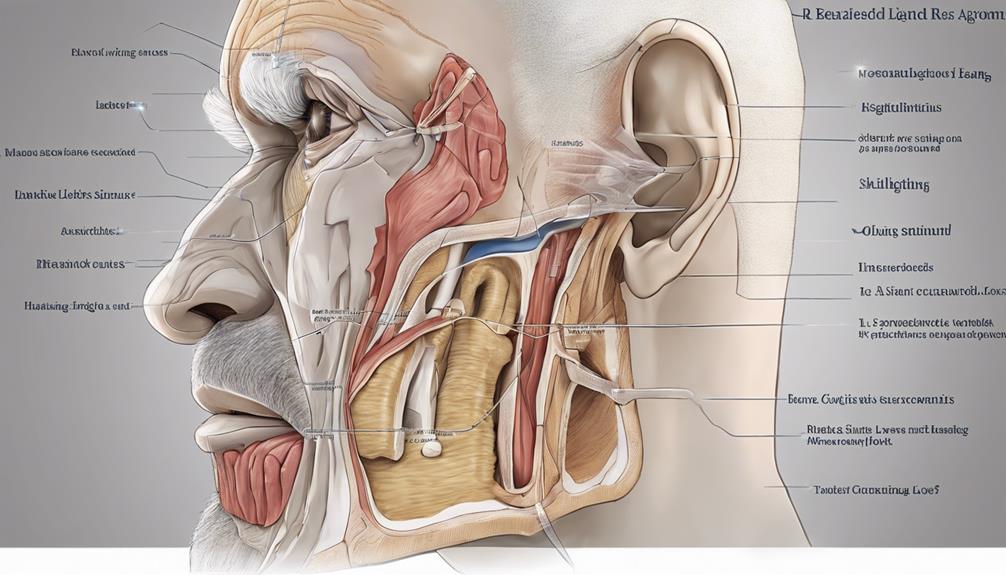Imagine attempting to navigate a tightrope while your view of the surface beneath is obscured. Similar to this risky balancing feat, our bodies depend on accurate sensory feedback to keep balanced.
However, when hearing loss enters the picture, the delicate interplay between hearing and balance can be disrupted, setting the stage for potential challenges.
But how exactly does this connection manifest, and what steps can be taken to restore harmony between our auditory and vestibular systems?
Let's explore the intricate relationship between hearing loss and balance issues to uncover the hidden complexities at play.
Key Takeaways
- Hearing loss disrupts inner ear function, leading to symptoms like dizziness and vertigo.
- Using hearing aids can enhance stability, reduce fall risk, and improve overall balance.
- Symptoms of hearing loss-related balance issues include vertigo, fatigue, and increased fall risk.
- Inner ear abnormalities from hearing loss can impact balance control, emphasizing the link between hearing and equilibrium.
Inner Ear's Role in Balance
The vestibular system within the inner ear actively maintains our balance by detecting head movements through its semicircular canals. These canals, sensitive to even minor head movements, play a crucial role in providing the brain with constant updates on our body's position in space. When the inner ear functions optimally, it contributes to our overall stability by accurately interpreting sensory input related to movement. However, issues within the inner ear, such as hearing loss, can disrupt this delicate system, leading to symptoms like dizziness, vertigo, and difficulties in maintaining balance.
Hearing loss can impact the vestibular system's ability to receive and process sensory information effectively, affecting the signals sent to the brain regarding body position. This disruption can manifest as feelings of unsteadiness, a spinning sensation, or even a loss of balance. Understanding the intricate connection between the inner ear, head movements, and overall stability is essential in addressing balance issues associated with hearing loss.
Impact of Hearing Aids on Stability

Enhancing stability and reducing fall risk, hearing aids have shown to significantly improve spatial awareness in individuals with hearing loss. The impact of hearing aids on stability extends beyond just hearing improvement; it plays a crucial role in maintaining balance control and postural stability.
Here are three ways in which hearing aids can positively influence stability:
- Enhanced Auditory Input: Hearing aids provide the brain with essential spatial information necessary for maintaining stability. This improved auditory input allows individuals to better perceive their surroundings, leading to more coordinated movements and reduced fall risk.
- Improved Gait Patterns: Research suggests that wearing hearing aids can contribute to better gait patterns. By enhancing spatial awareness, hearing aids help individuals adjust their walking pace and stride length, ultimately promoting more stable and balanced walking.
- Posture Support: The use of hearing aids can aid in maintaining proper posture. By assisting the brain in processing spatial cues, hearing aids enable individuals to adjust their body alignment more effectively, resulting in improved overall stability and reduced postural instability.
Symptoms of Hearing Loss and Balance
Experiencing symptoms of hearing loss and balance issues often manifests as vertigo, lightheadedness, or spatial disorientation. The relationship between hearing loss and balance problems is intricate, with various interconnected symptoms.
Individuals with hearing loss may experience fatigue as their brains work harder to process sounds, potentially impacting their overall balance. Moreover, the risk of falling is heightened in those with hearing impairments, particularly in the elderly. Tinnitus, the perception of noises in the ears or head, can also be a symptom of hearing loss that affects balance.
Vertigo, characterized by spinning sensations, nausea, and abnormal eye movements, is another symptom that can be linked to hearing loss. Recognizing these symptoms and their association with hearing loss is crucial for timely intervention and management to improve both hearing health and balance stability.
Conditions Linked to Hearing Loss

Among the various conditions linked to hearing loss are dementia, depression, diabetes, heart disease, and an increased risk of falls and accidents.
- Dementia and Cognitive Function: Dementia is associated with untreated hearing loss, impacting cognitive function. The inability to hear clearly can lead to cognitive decline and memory issues, highlighting the importance of addressing hearing loss promptly.
- Depression and Mental Well-being: Depression can be a consequence of hearing loss, affecting mental well-being. Feeling isolated due to communication difficulties can significantly impact mental health, underscoring the need for emotional support alongside hearing interventions.
- Diabetes and Systemic Effects: Diabetes may contribute to hearing loss, highlighting the systemic effects on the body. Managing diabetes is crucial not only for blood sugar control but also for preserving hearing health, emphasizing the interconnectedness of various health conditions with hearing loss.
Connection Between Hearing and Equilibrium
The relationship between hearing and equilibrium is fundamental to maintaining stability and spatial awareness in our daily lives. The inner ear's vestibular system, responsible for detecting motion and spatial orientation, is crucial for balance regulation.
When inner ear abnormalities occur, such as those leading to vertigo, dizziness, or disequilibrium, our overall balance can be significantly impacted. It's important to recognize the connection between hearing and equilibrium, as issues in one area can often affect the other, stemming from complications within the inner ear.
As we age, changes in the inner ear can contribute to both hearing loss and balance problems, highlighting the intricate relationship between these sensory functions.
Diagnosis of balance disorders involves specialized tests like Videonystagmography (VNG) to evaluate eye movements and identify underlying problems affecting equilibrium. Understanding the intricate connection between hearing and equilibrium is essential for effectively addressing issues that arise in these interconnected sensory systems.
Frequently Asked Questions
Can Losing Your Hearing Affect Your Balance?
Yes, losing our hearing can indeed affect our balance. When our hearing diminishes, it can impact how our brain processes spatial information crucial for balance. Reduced auditory input from hearing loss can disrupt the sensory processing needed for maintaining stability.
Studies have shown a clear correlation between hearing loss and balance instability. It's vital to address hearing loss promptly to help manage and prevent balance-related issues.
Can Ear Problems Cause Balance Issues?
Absolutely, ear problems can indeed cause balance issues. Our inner ear plays a critical role in maintaining equilibrium. Even minor disruptions in this delicate system can lead to dizziness, vertigo, and imbalance.
The vestibular system within the inner ear detects head movements and transmits signals to the brain for processing. When this process is compromised due to ear problems, it can significantly impact our body's balance mechanisms.
What Is the Connection of Hearing and Balance?
The connection between hearing and balance is intricate. Our inner ear's vestibular system plays a crucial role in maintaining balance. Complications in this system can lead to balance issues.
Hearing loss and balance problems often coexist due to their interlinked nature. As we age, these issues can worsen, impacting our overall stability.
Diagnostic tools like Videonystagmography help assess balance disorders by evaluating eye movements, highlighting the complex relationship between hearing and balance.
How Can Hearing Loss Impact Daily Function?
Hearing loss can significantly impact daily function. Our ability to communicate, enjoy music, and participate in social activities may be compromised. Simple tasks like following conversations or hearing alarms become challenging.
Seeking solutions, like hearing aids, can improve our quality of life and help us stay connected with our surroundings. Ignoring hearing issues can lead to isolation and frustration, hindering our overall well-being and daily activities.
Conclusion
As we navigate the challenges of hearing loss and balance, it's like trying to walk a tightrope in a windy storm without a safety net. Our inner ear's delicate balance is crucial for stability, just like a tightrope walker's focus and precision.
By addressing hearing loss and seeking proper treatment, we can equip ourselves with the necessary tools to maintain our equilibrium and prevent potential falls. It's all about finding our balance in the midst of life's unpredictable winds.










